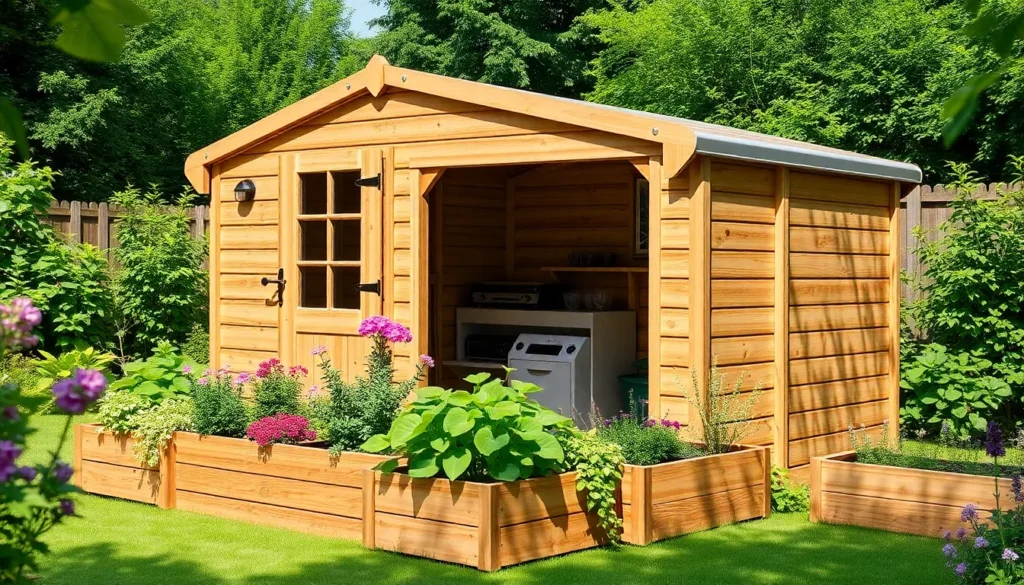In the heart of the Bluegrass State, sustainable living isn’t just a trend—it’s a way of life that’s as rich as the bourbon and as vibrant as the Derby. Picture this: lush green pastures, farmers markets brimming with fresh produce, and a community that knows how to recycle like pros. Kentucky’s approach to sustainability is as unique as its famous fried chicken, and it proves that living green can be both fun and fulfilling.
Table of Contents
ToggleOverview of Kentucky Sustainable Living
Kentucky emphasizes sustainable living as a key aspect of its identity. The state’s fertile land nurtures diverse agricultural practices, enhancing local food production. Community initiatives focus on organic farming and permaculture, attracting environmentally conscious residents. Farmers markets showcase fresh produce and artisan goods, reflecting a commitment to local economies and reducing carbon footprints.
Green energy adoption marks another important element in Kentucky’s sustainability efforts. Solar farms and wind projects increasingly supply power to homes and businesses. Residents participate in renewable energy programs, promoting energy efficiency and conservation.
Recycling and waste reduction efforts strengthen Kentucky’s commitment to sustainability. Local governments encourage proper recycling practices through educational campaigns and accessible collection programs. Many communities host clean-up events and workshops to raise awareness about waste management.
Urban areas also contribute to sustainable living. Green spaces and community gardens improve urban environments while fostering community connections. Public transportation options expand, encouraging residents to choose eco-friendly commuting methods.
Culinary traditions play an essential role in promoting sustainability. Local chefs embrace farm-to-table concepts, celebrating seasonal ingredients and contributing to a sustainable food system. Collaborative cooking events teach residents about food preservation and cooking with local produce.
Overall, Kentucky’s dedication to sustainable living harmonizes with its vibrant culture and natural resources. The collaboration among residents, businesses, and local governments ensures ongoing growth and positive change in the community.
Benefits of Sustainable Living in Kentucky

Sustainable living in Kentucky offers numerous benefits, impacting the environment and local economy positively. Residents enjoy cleaner air and conservation of natural resources, which contribute to healthy ecosystems.
Environmental Impact
Sustainable practices significantly reduce carbon emissions across Kentucky. Utilizing local produce cuts transportation-related pollution. Implementing community recycling programs decreases landfill waste, preserving natural habitats. Renewable energy sources, such as solar and wind, contribute to a reduction in reliance on fossil fuels. Enhancing biodiversity through organic farming supports local wildlife. Adopting sustainable landscaping techniques helps maintain soil health and water quality.
Economic Advantages
Economic benefits arise from sustainable living initiatives throughout Kentucky. Supporting local farmers markets stimulates the economy and keeps money within the community. Increased investment in renewable energy creates jobs in emerging fields. Energy-efficient practices lower utility costs for households and businesses, providing savings. Funding for green projects boosts local economies while promoting sustainability. Overall, these measures foster a resilient economy that prioritizes environmental responsibility.
Key Principles of Sustainable Living
Sustainable living in Kentucky revolves around key principles that promote environmental stewardship. Emphasizing practical actions leads to meaningful change in communities.
Reduce, Reuse, Recycle
Reducing waste starts with conscious choices in daily life. Individuals can minimize single-use items by opting for reusable options like cloth bags and water bottles. Local businesses play a role in this effort by providing sustainable products and packaging solutions. Implementing composting systems can divert organic waste from landfills and enrich soil. Successful recycling initiatives in communities help recapture valuable materials, reducing the need for new resources. Engaging residents through educational campaigns fosters a culture of sustainability, encouraging more responsible consumption patterns.
Energy Efficiency and Conservation
Energy efficiency represents a vital aspect of sustainable living. Homeowners can invest in energy-efficient appliances that consume less power while delivering high performance. Making small changes, such as sealing windows and using programmable thermostats, further enhances conservation efforts. Kentucky’s residents benefit from renewable energy programs, promoting the use of solar panels and wind energy. Utility companies offer incentives for energy-saving upgrades to homes and businesses. These measures collectively reduce greenhouse gas emissions, contributing to a healthier environment and more affordable energy costs.
Sustainable Practices in Kentucky
Kentucky fosters sustainable practices that reflect its natural beauty and cultural heritage. Diverse approaches permeate communities, emphasizing organic farming and renewable energy.
Organic Farming and Local Produce
Organic farming thrives in Kentucky, supporting local economies and enhancing food security. Farmers markets dot the landscape, showcasing fresh, seasonal produce that minimizes transportation emissions. Many growers engage in community-supported agriculture (CSA) programs, allowing residents to receive direct deliveries of local goods. Crop rotation and sustainable pest management further maintain soil health and promote biodiversity. Culinary collaborations elevate awareness about farm-to-table dishes, encouraging the public to appreciate local flavors. Each market visit fosters connections between consumers and producers, highlighting the importance of sustaining local food systems.
Renewable Energy Initiatives
Renewable energy initiatives gain momentum in Kentucky, with substantial investments in solar and wind projects. Solar panels increasingly adorn rooftops, empowering homeowners to harness clean energy. The state ranks as a growing player in wind energy generation, significantly reducing reliance on fossil fuels. Utility companies often provide incentives for energy-efficient home upgrades, ensuring affordability drives adoption. Community-led programs promote awareness of renewable options, guiding residents toward sustainable choices. Each new project contributes to decreasing carbon emissions, reinforcing Kentucky’s commitment to a greener future.
Community Involvement and Education
Community involvement plays a crucial role in Kentucky’s sustainable living efforts. Local organizations frequently host workshops that educate residents about recycling, composting, and energy-efficient practices. Schools often incorporate environmental education into their curricula, fostering a sense of responsibility among students toward sustainability.
Neighborhood groups participate in tree-planting events, enhancing urban green spaces while encouraging community bonding. Residents commonly gather for clean-up initiatives, which not only beautify local areas but also promote awareness of waste management.
Educational campaigns led by local governments aim to inform the public about proper recycling and waste reduction techniques. Various programs target households, helping them adopt energy-efficient appliances and practices.
Farm-to-table collaborations between farmers and chefs provide additional learning opportunities. These events teach participants about sourcing local ingredients and the benefits of supporting local economies. Many chefs advocate for sustainability, emphasizing the importance of using seasonal produce and reducing food waste.
Community gardens also offer hands-on education to residents, allowing them to grow their own food and learn environmentally friendly gardening practices. These spaces often serve as gathering points, fostering connections among neighbors and promoting a culture of sharing.
By focusing on education and community involvement, Kentucky enhances its commitment to sustainable living. Collective actions strengthen community ties while promoting a culture that values environmental stewardship and responsibility.
Kentucky’s journey toward sustainable living showcases a vibrant blend of community spirit and environmental responsibility. By embracing local agriculture and renewable energy, residents are not only preserving their natural resources but also enhancing their quality of life. The commitment to recycling and waste reduction reflects a deep-rooted culture of stewardship that resonates throughout the state.
As individuals and communities continue to engage in sustainable practices, Kentucky stands as a beacon of hope for others seeking to harmonize modern living with environmental care. This collective effort ensures a greener future while celebrating the unique heritage that defines the Bluegrass State.










